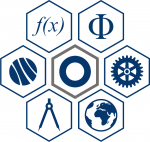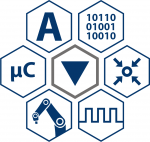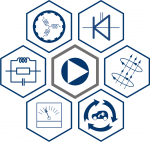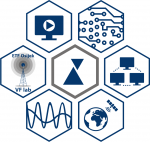

- Chair of Mathematics and Physics
- Chair of Mechanical Engineering and Foreign Languages
The Department of Core Courses is responsible for conveying fundamental knowledge and skills within the framework of the study programmes carried out at the Faculty. The Department collaborates with other departments in research activities and helps with the implementation of projects with the economy. It consists of the Chair of Mathematics and Physics and the Chair of Mechanical Engineering and Foreign Languages.
It should be pointed out that the Department of Core Courses is the largest at the Faculty with respect to the number of courses, teaching hours and other activities related to the teaching process. Almost all core courses taught in the 1st and 2nd years of study are the responsibility of our Department, whose teachers statistically have the highest number of students.
The teachers at the Department, especially those at the Chair of Mathematics and Physics participate in numerous projects conducted at other departments. Mathematicians help with various calculations or mathematical software tools, while physicists give assistance with modelling of physical relations when solving engineering and research problems. The Chair is also in charge of courses related to economics and management.
Staff employed at the Chair of Mechanical Engineering and Foreign Languages deals with modern technology of energy utilization, energy efficiency using ecological approaches to energy generation in modern plants and offers its services to domestic and international organizations whose activities concern energy generation. Foreign language teachers, on the other hand, contribute to Faculty’s work by translating and proofreading international and domestic projects, scientific and professional conferences, journals, etc. In the future the Department will contribute to science in general by active research work and will continue to improve the quality of the teaching process. Moreover, the Department plans to intensify its cooperation with colleagues from other departments, especially cooperation concerning publishing of scientific and professional papers, sharing knowledge on the latest trends in science, and joint participation in domestic and international conferences. Last but not least, the Department carries out physical education classes for all students.


- Chair of Programming Languages and Systems
- Chair of Visual Computing
- Chair of Applied Computer Science
- Chair of Theoretical Computer Science and Data Science
Strategic research guidelines of the Department of Software Engineering are mainly concerned with the following areas of research and development: ubiquitous embedded and distributed computing systems based on modern programmable, customisable, distributed computer architectures, and mobile and wireless environments. This includes digital signal processors (DSP), graphics processing units (GPU), as well as cloud and grid computing; algorithms and software solutions for the said platforms with a focus on development of time-critical systems, service-oriented systems, self-sustaining computer systems, big data analytics, which implies the principles of green computing, parallel programming, component-based software engineering, computational intelligence, still image and video processing, and other advanced approaches; procedures and software solutions in medical applications, traffic, mobile and wireless environments, industry and generally in intelligent living spaces.
The Department conducts classes in about 40 courses within the framework of two chairs. The medium-term strategy will include the harmonisation of the curricula of study programmes at all levels of with labour market needs (including the introduction of new courses), improving the quality of teaching and learning with an emphasis on modernising the laboratories and further adjustment of teaching and learning platforms to the arrival of new technologies. Several ongoing national and EU projects will help us establish the infrastructure planned to be more intensively used in all forms of lifelong learning.
The medium-term and long-term strategy of the Department include a further increase in the intensity of cooperation with international and national research institutions and the economy aiming to increase both participation in a number of international research projects, and the number and duration of outgoing and incoming mobility of researchers and students. The Department is currently taking part in several such projects and programmes. Scientific research and professional cooperation with the economy and public institutions are also ongoing strategic guidelines of the Department aimed at creating innovative solutions needed by the industry and the public sector. This primarily refers to the application of modern computer systems and software solutions in the fields of agriculture, medicine, and transport, and to the development of solutions to improve the efficiency of the industry and the public sector, and the quality of life in a broader sense.
The Development Strategy of the Department will be aligned with the Development Strategies of the Faculty of Electrical Engineering and of the University of Osijek, and thus the region and the Republic of Croatia, which stresses a significant role of the ICT sector and computer engineering with special emphasis placed on software engineering and the regional economy. The activities of the Department should strengthen the connection of education and research intended for business entities in the environment.
Chair of Visual Computing
The Chair of Visual Computing deals with modern methods of image analysis and processing in 2D and 3D environments. Its excellence is demonstrated by interstructural cooperation with medical science. Chair of Visual Computing staff conducts research on new methods of image compression based on partial differential equations whose result is Edge Enhancing Diffusion Compression with Symbol Prediction and Block Sorting. This compression is competitive to current image compression standards of JPEG/JPEG2000 at very high levels of compression. Furthermore, knowledge of image compression is applied to medical image processing and analysis and gives promising results in three-dimensional analysis of the human body for the prevention of cardiovascular disease. Members of the Chair also deal with the efficiency analysis of modern algorithms for processing and visualisation of large amounts of data.
Chair of Programming Languages and Systems
The Chair of Programming Languages and Systems is engaged in the development and advancement of algorithms that can be applied to distributed computing systems, real-time systems, in-depth data analysis and classification. Research and teaching staff apply the latest software quality assurance standards and the latest knowledge and technology in desktop, notebook and mobile applications. They develop software tools that will be used to assess the current state of technical systems.


- Chair of Computer Systems
- Chair of Artificial Intelligence and Robotics
- Chair of Applied Computer Engineering
The Department of Computer Engineering and Automation performs educational, research and processional activities. The Department’s mission is to educate students through university and professional study programmes in the fields of automation, robotics and process computing. Moreover, we intend to educate highly professional staff able to follow changes in technology and to apply acquired knowledge to solving engineering problems.
This education is based on research and professional activities performed by the staff, which also forms the basis for cooperation with other academic and economy partners in Croatia and abroad, all with the aim to increase the technological level of production systems in the region and to enhance the competitiveness of Croatian products on the European and global market. To fulfil and develop our mission, the Department plans to:
In order to attain the set objectives, it is necessary to conduct various activities aimed at the following: broadening the knowledge of teachers at the Department, advancing the teaching process by conveying fundamental and technology-related knowledge to students, improving the Department’s laboratories, establishing cooperation with the industry and other subjects from the economy, popularizing our scientific field among younger generations, etc.
Furthermore, to enable quality education of experts in our field, the Department of Computer Engineering and Automation has developed a new study programme at the graduate studies (branch: Industrial Automation), which will enable an effective integration of new knowledge related to automation, robotics, signal processing and artificial intelligence into the teaching process. The main objective is to achieve high compatibility of this study programme with those performed at other important and renowned faculties and universities. Additional quality of this knowledge transfer will be provided by involving the best graduate students (potential research assistants and assistants) in research work and activities concerning cooperation with the economy.
Regarding the progress in research work, the Department will continue to work on the improvement of its teachers through doctoral and postdoctoral study programmes, mobility of researchers and specialist trainings. The final objective is to form specialist teams able to deal with special technical problems. Furthermore, the Department intends to forge the bonds with other researchers and research institutions and will encourage cooperation with economy subjects and potential users of our research results. Moreover, we plan to apply for more EU research projects, as well as research and technology projects supported by the Republic of Croatia. The projects will contribute to better research conditions, enhancing the knowledge of our Department staff, which will lead to an increase in the number of published papers in relevant international scientific journals.


- Chair of Power Systems and Substations
- Chair of Power Plants and Energy Processes
- Electromagnetic Compatibility Laboratory
The Department of Power Engineering is one of the first departments at the Faculty of Electrical Engineering. Rich experience in the field of power engineering has resulted in numerous projects and successfully dealt challenges.
The Department of Power Engineering is involved in the following activities:
Chair of Power Systems and Substations
The Chair of Power Systems and Substations is planning the following activities:
Chair of Power Plants and Energy Processes
Plans to be realized are the following - follow our research at http://reslab.ferit.hr/
Electromagnetic Compatibility Laboratory
Plans to be realised:
The Department of Power Engineering owns renowned software tools for the analysis of power systems, networks and plants. Laboratory for Power Networks owns the most modern network analysers for measurements and the analysis of electrical energy quality LEM Topas 1000. In addition, it has Memobox 808 and the instruments for examining transformer oil and electrical installations properties.
The Electromagnetic Compatibility Laboratory has been accredited according to the HR norm. It has modern instruments for measuring low frequency electric and magnetic fields.
Within TEMPUS EMSA project, TEMPUS EMSA laboratory is equipped with modern computers, presentation equipment and software tools all of which are available to students for conducting their research and writing diploma papers. Some of the software tools the Department of Power Engineering has are EasyPower, DIgSILENT PowerFactory, PowerWorld, Homer. ETS 4.0, Eplan Electric P8, EMCAS, Relux, etc.


- Chair of Fundamentals of Electrical Engineering and Measurements
- Chair of Electric Machines and Power Electronics
- Laboratory for Hybrid Electric Drives and Automation
The Department of Electromechanical Engineering is a predecessor of the historical nucleus from which the Faculty of Electrical Engineering Osijek originates, and this is reflected in the fact that activities of this Department are still based upon courses Fundamentals of Electrical Engineering and Electrical Measurements as fundamental courses in the field of electrical engineering, while scientific and professional strength of the Department of Electromechanical Engineering lies in the fields of electric machines and power electronics. The Department consists of two chairs, and it has five laboratories, which resulted from good engineering practice that all courses held within the framework of this Department relate theoretical knowledge to practical work in the laboratory. Scientific research, professional work and expertise are based on the competencies of staff members of the Department of Electromechanical Engineering implying cooperation with the economy through the following activities:
Mission of the Department of Electromechanical Engineering is education and training of future experts in the field of electric machines and drives, as well as management and process automation in industry, power engineering and transport. An equally important aspect is the area of power electronics as the foundation of modern industrialisation in terms of training for the development, engineering design, production management, commissioning and maintenance of modern electrical equipment. The Department consists of two chairs, and it has five laboratories, which resulted from good engineering practice that all courses held within the framework of this Department relate theoretical knowledge to practical work in the laboratory. The vision of the Department of Electromechanical Engineering is based on young professional scientists, whose aim in the coming period is to equip a modern Centre for Electric Machines for the wider region, which, in addition to elementary study and testing of electric machines themselves, entails detailed research in the field of electrical measurements as a basis of electrical engineering, as well as in the field of power electronics as the flywheel in the development of industrial automation, but also new trends in usage of renewable energy sources. The second direction of development is based on current trends in the use of numerical calculations in modelling electromechanical devices based on theoretical electrical engineering the aim of which is to form a scientific research team, or to establish a laboratory for numerical calculations in electrical engineering. In the forthcoming period, the development shall be based on several directions:
1. Establishment of a modern Centre for Electric Machines as a scientific research centre of excellence within the framework of which the following laboratories shall be affirmed:
• Electric Machines Laboratory
• Electric Drives Laboratory
• Laboratory for Electric Circuits Analysis and Metrology
• Power Electronics Laboratory
• Laboratory for Testing Electric Vehicles and Vessels
2. Establishment of the Photovoltaic Power Systems Laboratory as a component of the future Centre for Renewable Energy Sources under the leadership of the Department of Power Engineering. The main task of this Laboratory is to develop procedures for exploring power converters typical of photovoltaic systems.
3. Establishment of the Numerical Calculation Laboratory as a component of the future Centre for Numerical Calculations in Electrical Engineering, which would be developed parallely by the Department of Communications, the Department of Power Engineering and the Department of Computer Engineering and Automation. Modern trends in the use of numerical calculations in modelling electromechanical devices today are an indispensable part of the process of designing, planning and analysis, and they are based on the fundamental laws of electrical and magnetic fields, Maxwell’s equations and boundary conditions.
4. Principles of the research strategy aim at creating preconditions for linking scientific research and professional work, which would enable employees of the Department of Electromechanical Engineering to participate in professional projects and expertise. In so doing, the funds necessary for the purchase of equipment for the creation of conditions for research, testing and measurements shall be provided first through scientific projects from pre-accession funds and later on from the Cohesion and Structural Funds. Hence, it is necessary to increase the number of applications for EU research projects in order to reinforce the publication of research results in international scientific journals with the impact factor. It is also necessary to intensify connections with universities in the EU and the immediate region, as well as to apply for joint projects, which also implies greater mobility of scientists of the Department of Electromechanical Engineering. Currently, employees of the Department of Electromechanical Engineering have successful communication with scientists from the immediate region, i.e., Zagreb, Split, Maribor, Budapest, Novi Sad, Tuzla, and Sarajevo, as well as with scientists from Spain, Greece and Ukraine.


- Chair of Radiocommunications and Telecommunications
- Chair of Electronics and Microelectronics
- Laboratory for High Frequency Measurements
- Chair of Multimedia Systems and Digital Television
The Department of Communications is active within the scientific and research environment of the Faculty of Electrical Engineering and Josip Juraj Strossmayer University of Osijek. The Department was established in 2003 and is organised into two chairs (Chair of Electronics and Microelectronics and Chair of Radiocommunications and Telecommuncations) and an accredited Laboratory for HF Measurements. The Department employs 10 researchers in the scientific-educational title, 2 assistants, 2 research assistants, 2 associates and 1 laboratory technician. Science and research is performed through national scientific projects (3 projects supported by the Ministry of Science, Education and Sports, from 2007 to 2013), HAKOM, HIT, BICRO, international projects (e.g. Tempus KISEK, Eureka ITEA I and ITEA II), and through research within the frame of the postgraduate doctoral study programme.
The basis for further development of the scientific and research activity at the Department lies in human resources. It should be emphasised at this point that in the past years six young scientists have earned their doctoral degrees and have been appointed into scientific-educational titles. Furthermore, it is impossible to perform scientific research without investing into infrastructure and research equipment. Therefore, the financial resources obtained through projects like MZOS, BICRO, HIT, Eureka etc. have been invested into research equipment thus ensuring basic conditions for quality research.
The significance of the Department also lies in its plan to strengthen the bonds with the economy and local community. Accordingly, a successful application of new technologies to the economy represents a challenge for establishing new economy subjects, direct economy investments into research, development and innovation resulting in the development of the region and the Republic of Croatia, and hence the creation of new employment opportunities.

Kneza Trpimira 2B, HR-31000 Osijek | Cara Hadrijana 10b, HR-31000 Osijek Tel: +385 (0) 31 224-600 | Fax: +385 (0) 31 224-605
IBAN: HR19 2390 0011 1000 16777, HPB | OIB: 95494259952 | PDV id. / VAT id.: HR95494259952 © 2021 FERIT | ferit@ferit.hr